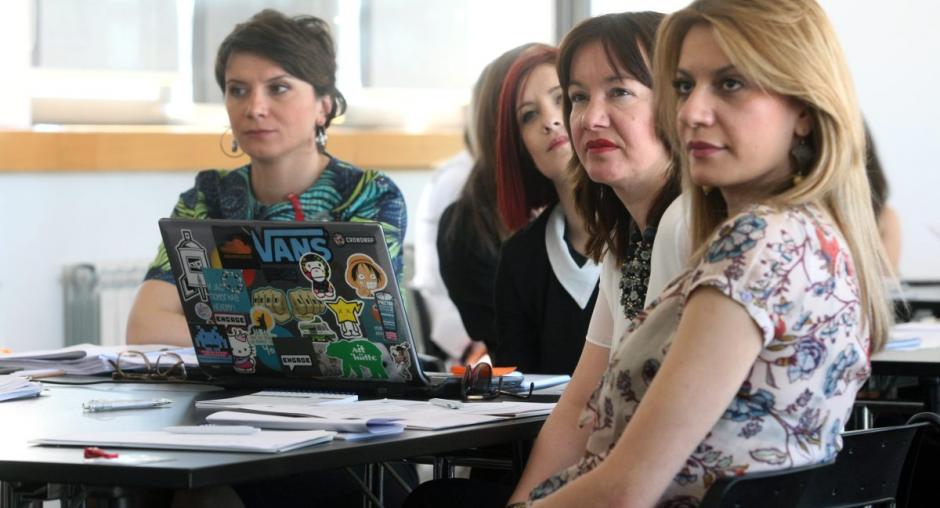Youth political participation must prevail
Political participation is in constant decline across the world (UNDP study). Young generations and youth especially is at risk of not being included in the decision-making process, which is potentially presenting a security risk for the future.
“Democracy is a model that needs to be won by every generation,” says Ida Birkvid Sorensen, board member of the European Youth Forum. “We need to strengthen youth organizations where young people actively practice democracy.”
Young people's relationship with contemporary politics is complex and often problematized. That is why one of the priorities of the Swiss and the Serbian consecutive Chairmanships of the OSCE was to create pathway for youth political participation.
“Although many believe that youth political participation is in decline, it seems that European Youth Forum with its 99 National Youth Council and International NGOs are showcasing how young people can be organized, motivated and determined to take their rightful part in the decision making process,” said Ida.
The OSCE Office for Democratic Institutions and Human Rights (ODIHR), in co-operation with Mission to Serbia and supported by Serbian Chairmanship, hosted a Regional Seminar on Youth Political Participation in Belgrade on 2 June 2015.
Regional good practices, challenges, experiences
For the South East Europe region, this path is in the making. According to Marko Boko from the Croatian Youth Network (MMH), “national youth councils in the Western Balkans still need recognition and support from governments.”
Youth organizations in the region seem to be active in contributing not solely to processes such as reconciliation, mobility, intercultural learning and youth work, but also in networking of youth wings of political parties, such as the Youth Initiative for Human Rights from Serbia.
“Despite certain skepticism and ongoing debate, one step further to the youth co-operation in Western Balkans is welcome by all. Process of establishing of the “Western Balkans Youth Office”, that would connect more systematically young people from Albania, Croatia, FYR of Macedonia, Montenegro, Serbia, Slovenia and Kosovo, is currently unfolding,” says Marko.
New age - new approach
Social media continue to be an important platform for communication and advocacy. “Like never before, we can use social media to express opinions, as well as to contribute to spilling online atmosphere into offline contexts,” said Tomaž Deželan, Youth Policy Expert from the Faculty of Social Sciences University of Ljubljana.
When Belgrade authorities initiated reconstruction of the Student Park, which included tree-cutting, citizens launched a social network campaign, not only to raise awareness, but to criticize the decision.
Tomaž also argues that modern state and its institutions are no longer the main stakeholders regarding political decisions. “We are experiencing the decline of institutional politics, and youth are drawn more towards other forms of engagement. These days, young people are more issue-oriented and political parties struggle to attract them.”
Although majority would agree that to be or not to be on social media should not be a question at all, some argue that many politicians are not keeping up with the technology.
“Internet use highly correlates with critically reflecting politics,” says Darko Soković from Dokukino Foundation. “The other side of the coin include so called bots (web robot), hired persons who write comments on the Internet in favor of political parties, and alleged online censorship. Demotivating youth from involvement or on the other hand using them as a tool to achieve their own goals is a potential problem.”
Political literacy is a must
“In the year of marking 40 years since the signing of the Helsinki Final Act, we should recall of the principles set back then recognizing youth as an agenda topic,” said Milena Stošić, OSCE Chairmanship Special Representative of on Youth and Security.
“Political participation is not only about membership in a party. It is also about the right to have a say on policies influencing everyday life; it is about the freedom of expression online and offline; about assembly of think-a-like advocates for clean water, or against armed conflicts; about opportunities of under-privileged to get education and rights of privileged to oppose affirmative actions.”
“Politics is stretching throughout many aspects of our lives. Therefore, political literacy of youth is crucial, as well as support to different forms of youth organizing,” Stosic concludes.

